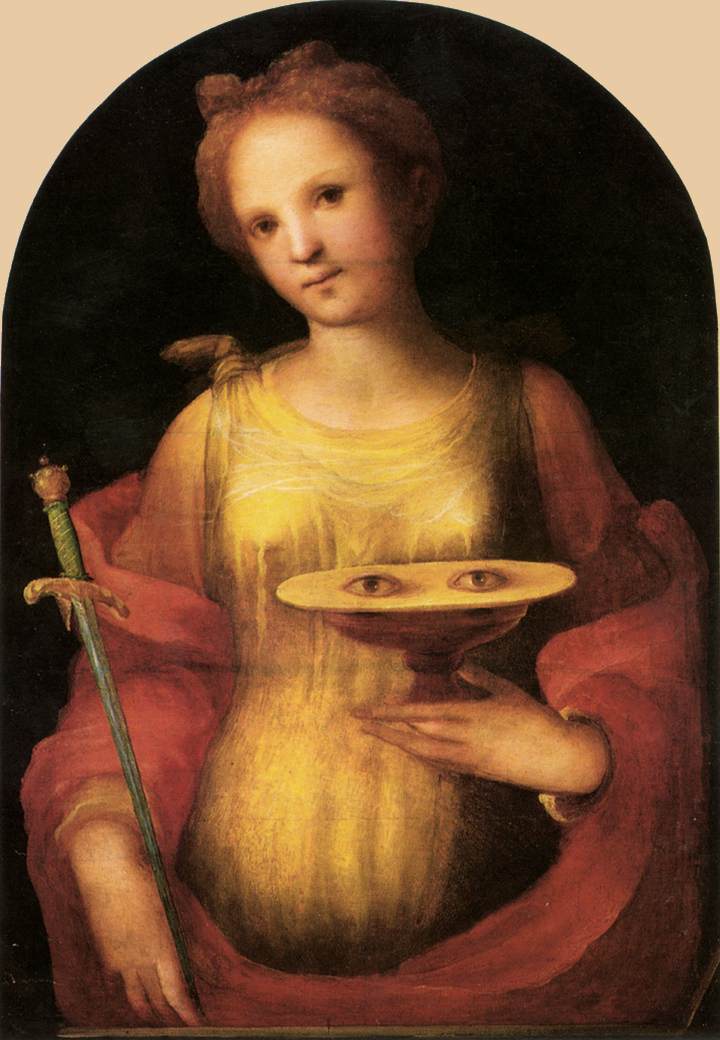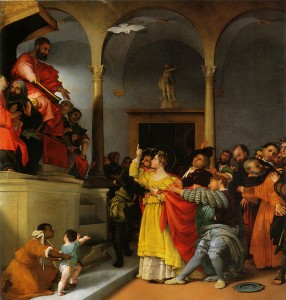
Name: Saint Lucia, Lucia of Syracuse, Saint Lucy.
Tagline: Born to a wealthy roman family, Lucia swore herself to virginity, and gave her dowry to the poor, somewhat irking her prospective husband. In the end, she was executed by the governor of Syracuse.
Claim to Fame: Saint Lucy is venerated on the 13th of December in many places around the world, particularly in the Nordic Countries.
In Denmark, as well as Sweden, Norway and Finland, most schools and many other places will have girls walking around with candles on their heads today. This is done in observance of Lucia Day. I have to say, though, that the day seems to have relatively little to do with the saint on whom it is based. Of course, if you have ever lived in a Nordic country in December, you may understand the desire to grab any occasion to celebrate with candles and light.
Lucia herself was born in Syracuse on Sicily in 283 (making her 13 years younger than Saint Nicholas, by the way). Her father was out of a pagan Roman family of wealth, while her mother, Eutychia, seems to have been Greek, and probably Christian. In any case, the girl grew up Christian, and decided to swear her virginity to god.
Her father had died when she was very young, and her mother suffered from a bleeding disorder. That naturally made her fear for her young daughter’s future. For that reason, she made a marriage agreement for her daughter with the son of a pagan family.
Now, close to Syracuse was the city of Catania, where the martyr, Saint Agatha, had died fifty odd years before. A shrine to her had been erected in that city, and many miracles were reported there. And so Eutychia was persuaded to take a pilgrimage to the shrine, in the hopes that she would be cured.
While her mother was at the shrine, Lucy received a vision of Saint Agatha, telling her that because of Lucia’s faith, her mother would be cured, and that Lucia herself would be the glory of Syracuse. And her mother was healed.
Upon Eutychia’s return, her daughter convinced her to give a significant amount of money to the poor. Eutychia wanted to do so at her death, but Lucia convinced her that money given at the end of her life to ensure entry to heaven would be a selfishness, while money given during her life would be the true virtuous gift.
When Lucia’s husband-to-be heard of her charity, he became incensed, as the money was part of the dowry that was art of the marriage between him and Lucia. As revenge, he went to the governor, Paschasius, to tell him of Lucia’s deeds, and her Christianity.
This was during the persecutions of Diocletian that also saw Saint Nicholas in prison. And so the governor summoned Lucia, and demanded that she make a sacrifice to the deified emperor. When she refused, he sentenced her to be sent to a brothel as a prostitute. But, so tradition has it, though strong men came to carry her away, she could not be moved from the spot.

Paschasius did not give up so easily, though. He ordered wood to be piled up around her, and set fire to the wood. But when the fire had burned down, she was completely unscathed. Finally, the governor ordered that she be decapitated, and finally, she died.
A common theme in tales about Lucia is that she lost her eyes at one point. I think my favorite version of the story is this: at one point, a young had fallen in love with Lucia, particularly praising her beautiful eyes. And so the girl gouged out her eyes so that he should not sin by lusting after her. She may or may not have sent them to him on a platter. A common theme of the eye-gouging tale is that her eyes were discovered to have regrown when she was buried after her execution.
How would I use her: When I was writing the post about Saint Nick, I couldn’t stop thinking about how unusual his story seems for an early Christian saint. So little bloodshed, pain or misery! Saint Lucy seems to be much more typical, full of intense piety, self sacrifice and a healthy dash of gore. And so if you need a saint, look more to Lucia than to Nicholas.
Common for both of them, and for all saints, is that they are portrayed in a superhuman light. They are superheroes before the first superhero. But while they perform miracles (performing miracles is a requirement for canonisation), their superpowers are more in the realm of virtue and morals than in the realm of physical or mental capabilities. In that sense, they are mirror images of superheroes: where superheroes can overcome most physical challenges with relative ease, they are usually beset with challenges to their morality and ethics. Saints, meanwhile, usually have unwavering conviction and faith, but are challenged by physical challenges – like being burned alive. Of course, the point of telling the story of a saint is to inspire the listener to emulate the saint on the path of virtue, while the point of the superhero is more likely to be for their struggles to be something we can relate to, writ large. At the point in the story when Saint Lucia is gouging out her eyes, Kamala Khan/Ms. Marvel is trying to prevent her parents from discovering her secrets – though it’s about being a superhero, rather than having a boyfriend, or wanting to hang out with friends instead of doing homework.
One final thought: Yesterday, we took a look at Karen Blixen, who is a perfect model of a Crone: the wizened, wise woman. Lucia, meanwhile, is clearly a maiden: young and innocent, full of erotic potential (that she is giving up as an offering to God). That just leaves us to find a Mother to fulfil the traditional trinity of female deities. Margaret I could work, as she is clearly a mother, but I feel like she doesn’t quite fit the mold of a motherly, nurturing type. So who would you choose as an embodiment of the Mother archetype?